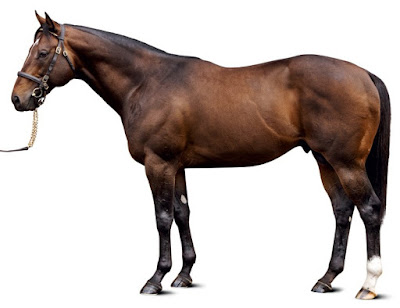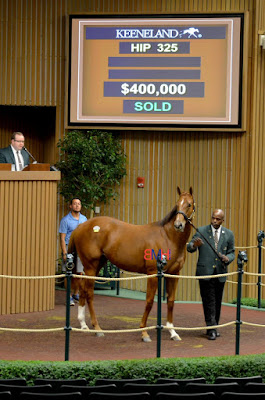Shamardal Makes Impact at Royal Ascot
 |
| Shamardal |
Royal Ascot has come and gone and with it brought many storylines to
last us until 2020 with multiple stallions having much success, both new and
old. In today’s blog, I look at eight different interesting points that we were
left with when the Queen headed home after the final race on Saturday,
including a resurgence of some stallions and debut of others.
By The Numbers: One hundred and seventy seven stallions had horses
entered (pre-scratches) at Royal Ascot over the five day meet. Of those, 11 had
entries every day and 20 stallions overall sired 29 individual winners at the
meet (Blue Point won both the G1 King’s Stand and G1 Diamond Jubilee). Forty-five
different stallions had horses hit the top three in the 30 races with Frankel (Galileo),
Galileo (Sadler’s Wells) and Kingman (Invincible Spirit) the only three
stallions to have horses finish first, second, and third throughout the week.
Birthdays: Of the 29 winners, 12 (41.38%) were born in February
and nine in March (31.03%). April and May teamed up for seven combined winners
while January only had one – that January foal coming at the end of the month.
Daahyeh (Bated Breath) was born earliest with a January 29 birthday while Defoe
(Dalakhani) was born latest with a May 8 birthday.
Shamardal: Shamardal (Giant’s Causeway) tied with Bated Breath (Dansili),
Galileo and Sea The Stars (Cape Cross) with most winners but stood alone with
most wins thanks to Blue Point’s double. The stallion’s big day came on
Saturday when Pinatubo broke the juvenile record in the Listed Chesham, Blue
Point won the King’s Stand and Cape Byron won the Wokingham Stakes. Shamardal is
also the sire of G1 Coronation third-place finisher Jubiloso.
If that isn’t enough, Shamardal is also the sire of stallion Mukhadram,
whose Thanks Be won the Sandringham Stakes for Hayley Turner.
Juddmonte Sires: Juddmonte has a group of exciting young sires
coming up in their barn and that was evident at Ascot. Juddmonte stallions sired
seven winners of the Royal meeting, led by Bated Breath with three. Frankel accounted
for two others with Kingman registering his second career Royal Ascot winner
and Oasis Dream (Green Desert) also adding to the total. The stallions also had
eight other top three finishers to see Juddmonte stallions take up 16.67% of
the top three spots.
Pivotal: The evergreen Pivotal (Polar Falcon) registered a
winner at Royal Ascot as a sire thanks to Addeybb with Fujaira Prince also giving
him a third place finish. The Cheveley Park stallion has also proved in recent
years to be possibly even more successful when found in the second generation
and that was seen here.
His son Farhh was one of three Darley sires with a winner at Royal
Ascot when Move Swiftly won the G2 Duke Of Cambridge while another one of the
Darley stallions was also impacted by Pivotal with Slade Power’s G2 Queen Mary winner
Raffle Prize out of a Pivotal mare. That was one of three winners out of
Pivotal mares with his daughters producing G1 Prince Of Wales’s winner Defoe
and G1 Commonwealth winner Advertise (Showcasing).
 |
| Gleneagles was one of the youngest to sire a Royal Ascot winner. |
Ages: A popular topic of conversation for breeders is the age of
sire and dam at conception. For Royal Ascot winners, the average age of their
sires at conception was 8.92 years of age (in the cases of four stallions,
multiple winners came from the same crop so their age for that crop was only
used once).
The youngest stallions at conception were Gleneagles and Kingman, whose
winners were conceived in their first year standing at stud when four years of
age while the oldest was Addeybb when Pivotal was 20. Seventeen sires were younger than 10 when the
horse was conceived while seven where older than 10. All three of Galileo’s
winners came from the crop conceived when he was 17 while Sea The Star had two
conceived when he was 10 years younger than his half-brother and Shamardal had
two from his 11 year old conceived crop.
Mares trended a bit higher at 9.97 years of age but it should be noted
that none of the mares had two winners and Blue Point is only counted once. The
youngest mare was Defoe’s dam Dulkashe (Pivotal), who conceived him when she
was four and the oldest was Bionic (Zafonic), who conceived Biometic (Bated
Breath) when she was 19. The mares had an even split between 10 and younger and
10 and older with 14 under 10 and 14 above 10.
Doubling Up: Dalakhani (Darshaan), Galileo and Pivotal pulled
double duty as both sire and damsire of winners at the Royal Ascot meet with
Pivotal and Galileo also the grandsire of at least one winner. They weren’t the
only stallions to “double up” with Giant’s Causeway (Storm Cat), Darshaan
(Shirley Heights), Invincible Spirit (Green Desert), and Sadler’s Wells
(Northern Dancer) both the grandsire of one winner and damsire of another.
Young Sires: The future looks bright for the breeding industry after
Royal Ascot with Gleneagles (Galileo) siring a 2019 Royal Ascot winner from his
first crop and Kingman, Mukhadram, Olympic Glory (Choisir), No Nay Never (Scat
Daddy), and Slade Power (Dutch Art) from their second crops. Overall, eight stallions
with Royal Ascot winners were six or younger when the runner was conceived,
showing the new guard has much talent coming up.


Comments
Post a Comment